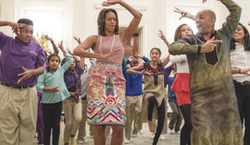 Michelle Obama learns a Bollywood dance
Michelle Obama learns a Bollywood dance WASHINGTON, D.C. - First Lady Michelle Obama welcomed guests to the White House and lit a lamp amidst Sanskrit chants to mark the Diwali celebrations on Nov. 5. The celebration started with the First Lady surprising everyone by trying out some Bollywood dance moves and endearing herself in the process to those at the event. class of 40 children. Mahajan later said, that the First Lady joined in to learn some steps to the A.R.Rahman, Oscar winning tune, “Jai Ho.”
Wearing a special skirt exclusively made for her by India-born designer Naeem Khan who also attended the event, Michelle Obama then got down to a more serious note at the reception that followed. She said, “We’ve celebrated this holiday here at the White House every year since Barack took office.
Wearing a special skirt exclusively made for her by India-born designer Naeem Khan who also attended the event, Michelle Obama then got down to a more serious note at the reception that followed. She said, “We’ve celebrated this holiday here at the White House every year since Barack took office.
And there’s a reason why we’ve done that. When we say that we want to make the White House the “people’s house,” we mean all people. We mean that we want to honor and embrace all of the many cultures and faith traditions that make us who we are as Americans. And Diwali is very much one of those traditions.”
“Diwali,” she said, is celebrated by members of some of the world’s oldest religions not just here in America but across the globe. “It’s a time to come together with friends and family, often with dancing and good food. But Diwali is also a time for contemplation and reflection. It’s a time for us to think about our obligations to our fellow human beings, particularly those who are less fortunate than we are.” Showing her understanding of the festival, she said, “as we light the diya — the lamp — we recommit ourselves to the triumph of light over darkness, of good over evil.”
“Diwali,” she said, is celebrated by members of some of the world’s oldest religions not just here in America but across the globe. “It’s a time to come together with friends and family, often with dancing and good food. But Diwali is also a time for contemplation and reflection. It’s a time for us to think about our obligations to our fellow human beings, particularly those who are less fortunate than we are.” Showing her understanding of the festival, she said, “as we light the diya — the lamp — we recommit ourselves to the triumph of light over darkness, of good over evil.”

 RSS Feed
RSS Feed
